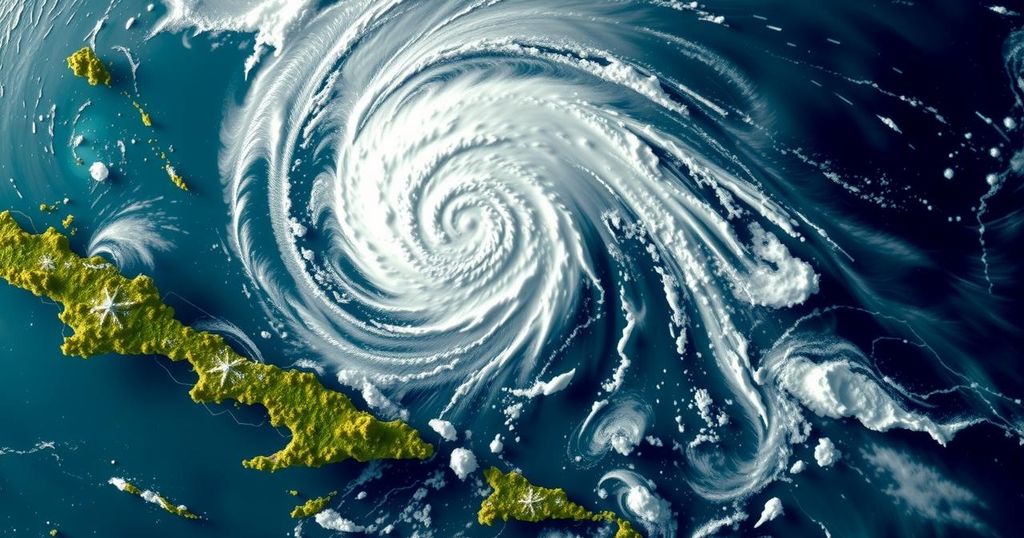Tropical Storm Oscar Progresses Towards the Bahamas After Impacting Cuba

Tropical Storm Oscar is heading towards the Bahamas after causing at least six deaths in Cuba as a hurricane. Currently, it has weakened to a tropical storm, generating significant rain and flooding risks. Oscar is notable for being the smallest recorded hurricane, and while it affects the eastern Caribbean, Tropical Storm Kristy is developing in the Pacific.
Tropical Storm Oscar is currently advancing towards the Bahamas after having made landfall in Cuba as a Category 1 hurricane. The storm has resulted in the unfortunate deaths of at least six individuals while unleashing significant rainfall over an island that is concurrently grappling with a debilitating power outage. As of Tuesday morning, Oscar was positioned approximately 45 miles (75 kilometers) south-southeast of Long Island in the Bahamas, exhibiting winds of 40 mph (65 kph) and a movement trajectory of north-northeast at 12 mph (19 kph), according to the National Hurricane Center based in Miami. Although currently assessed as being barely a tropical storm, Oscar is predicted to bring up to 5 inches (13 centimeters) of rain to the southeastern Bahamas, with isolated areas possibly receiving as much as 8 inches (20 centimeters). A tropical storm warning is active for the central and southeastern regions of the Bahamas. Oscar has distinguished itself as the smallest hurricane on record, with a wind field measuring merely 6 miles (10 kilometers) across. Its sudden transformation into a hurricane during landfall at Grand Inagua Island in the Bahamas on Saturday and subsequently in eastern Cuba late on Sunday took many by surprise, leading to significant forecasting failures as indicated by Michael Lowry, a recognized hurricane specialist and storm surge expert. During its passage, Oscar delivered over 15 inches (38 centimeters) of rain in some eastern Cuban locales, prompting warnings of inundation and potential landslides. Notably, the six fatalities reported occurred in Guantánamo. The storm’s timing is critical, as Cuba is endeavoring to recover from a widespread blackout that has instigated minor protests and official advisories against any dissent. Oscar represents the 15th named storm and the 10th hurricane characterized in the Atlantic hurricane season, which spans from June 1 to November 30. The National Oceanic and Atmospheric Administration (NOAA) had previously projected an above-average hurricane season due to unprecedented ocean temperatures, expecting 17 to 25 named storms and four to seven major hurricanes of Category 3 or above. Meanwhile, Tropical Storm Kristy is also being monitored over the Pacific Ocean. Positioned 375 miles (605 kilometers) west-southwest of Acapulco, Mexico, Kristy has sustained winds reaching 50 mph (85 kph) and is advancing west-northwest at a speed of 15 mph (24 kph). It is anticipated that Kristy will escalate into a hurricane by Tuesday evening.
The Atlantic hurricane season is a significant meteorological period, generally occurring from June 1 to November 30. This season experiences various atmospheric conditions that contribute to storm development. Tropical storms and hurricanes are classified based on their sustained wind speeds, with hurricanes categorized from one to five, according to the Saffir-Simpson scale. The current season has seen a notable number of storms due to warmer-than-average sea temperatures, which facilitate the formation and intensification of cyclonic systems. The impacts of these storms often extend beyond physical damage, inciting socio-economic challenges and disasters, such as power outages and fatalities, particularly in vulnerable regions like the Caribbean.
In summation, Tropical Storm Oscar has significantly impacted Cuba and is now threatening the Bahamas with heavy rainfall and potential flooding. With a record as the smallest hurricane and notable forecasting challenges, Oscar serves as a reminder of the unpredictable nature of tropical systems. As the Atlantic hurricane season continues, monitoring and preparation remain paramount for affected regions.
Original Source: www.usnews.com







